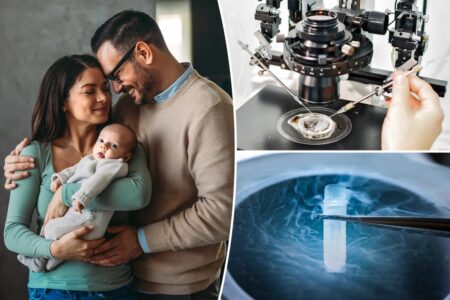Jordan Kruse realized something was wrong with her newborn, Pruitt, hours after bringing him home from the hospital last year.
“He started to refuse nursing,” Kruse, 32, told The Post. “You’re supposed to nurse [newborns] every two hours, so that was my first sign.”
What followed is every new parent’s biggest fear — the South Dakota infant became extremely sick with a rare, inherited metabolic disorder and died at just 6 months old.
As they approach the first anniversary of Pruitt’s death, the Kruse family is continuing to raise awareness about ornithine transcarbamylase (OTC) deficiency and pushing hospitals to prioritize early ammonia testing in symptomatic newborns in the hopes of preventing other devastating deaths.
“Our hospital … changed their protocol,” Kruse said. “That’s something I hope that other hospitals in our area and around the states can start.”
A brave fighter
Pruitt arrived on May 17, 2024, joining his two older brothers, Paxton and Pryor.
Jordan — a schoolteacher like her husband, Chris — had quietly hoped for a girl. She eventually embraced the boy mom spirit.
Her pregnancy was fairly uneventful — she was diagnosed with gestational diabetes, a common condition — and her delivery was unremarkable.
The family was discharged two days later since things were “blissfully fine.” Disaster struck within hours.
“Things drastically changed in that short amount of time home with him,” Jordan said.
Failing to nurse was the first clue — then Pruitt started making weird grunting noises.
It didn’t seem like he was in respiratory distress. He just appeared uncomfortable.
The Kruses brought him to the ER. A frenzied array of labs ensued.
Doctors initially suspected a bacterial infection, but those tests kept coming back negative.
Finally, after two excruciating days, the genetics team was consulted and an ammonia test was run.
Pruitt registered a whopping 1,256 micromoles per liter — under 90 is considered normal for full-term infants.
“Once they got that ammonia [level], they were able to start doing the treatment plans and try to get things under control,” Jordan said.
“But that late ammonia [reading] was very devastating,” she added. “He had significant brain damage due to that high elevation of ammonia.”
Inside OTC deficiency
It’s normal for healthy bacteria in the body to produce ammonia as they process proteins and amino acids from food. While low levels are safe, high levels can be toxic, especially to the brain and liver.
Newborns may have naturally higher ammonia levels because their livers are still developing.
Elevated ammonia levels can also occur when the enzymes needed for protein processing are faulty, leaving the body unable to properly remove ammonia and other waste products.
This is known as OTC deficiency, which affects about 1 in 63,000 Americans.
It’s caused by a mutation in the OTC gene, located on the X chromosome.
Males usually experience more severe symptoms because they have only one X chromosome.
Females are typically considered carriers since they have two X chromosomes. Their second, normal X chromosome often compensates.
Most female carriers are initially asymptomatic, though some may eventually experience migraines, vomiting and exhaustion.
Jordan learned in the hospital that she is a carrier. She has one copy of the altered OTC gene, which she passed on to Pruitt.
Jordan takes citrulline to help her body get rid of ammonia and undergoes yearly testing.
Pruitt’s two older brothers tested negative, a sigh of relief for the family.
A beautiful life cut short
The name Pruitt means “brave little one.” Pruitt Kruse lived up to his name.
He initially spent about 45 days in the hospital, as his medical team worked to get his ammonia levels down and stabilize him with the proper protein diet.
When Pruitt finally went home, he faced a long road. He was on an overwhelming amount of meds to keep his ammonia in check, prevent seizures and relax his muscles.
He also had a feeding tube and a hemodialysis catheter that could rapidly remove ammonia from his blood.
“It was a very big wake-up call,” Jordan said. “Life was structured a lot differently than what we expected it to look like going home with our third child.”
The Kruses brought Pruitt back and forth to the hospital so his medical team could adjust his diet based on his labs. The situation was grim.
“We did end up doing three MRIs with him because [with] babies’ brains, things can regenerate,” Jordan explained. “It looked bad every single time; it just continued to get worse.”
Keeping Pruitt’s memory alive
There were moments of joy among the constant check-ups.
Pruitt visited a zoo, butterfly house, pumpkin patch and apple orchard with his older brothers.
A smile would occasionally flicker across his face. He also cooed, babbled, rolled over and seemed to find comfort in a sloth stuffy.
Sadly, as the Kruses worked to get him a liver transplant, Pruitt died on Nov. 22, 2024.
The family channeled its pain into purpose and established the Brave Little One Foundation.
The nonprofit supports families facing medical hardship, provides free adaptive clothing for children with feeding tubes and educates about OTC deficiency and its symptoms.
Ammonia testing is not routine for all newborns — but Jordan hopes that it will become more common in the urgent workup for those showing signs of neurological problems like lethargy, poor feeding, vomiting or seizures.
The test typically costs between $18 and $90.
Sanford Health, the Sioux Falls hospital where Pruitt was born and treated, has already updated its protocol to add an ammonia lab.
Jordan wants other hospitals to follow suit. In the meantime, she continues to hold Pruitt in her heart.
“[November] marks a year since he passed away, so I feel like the grieving process has definitely changed for me over time,” Jordan said.
“I’m still grieving him, but I’m learning that I have to move forward with life and make the best of what I have.”
Read the full article here

















